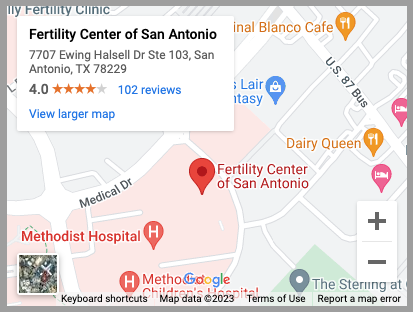Discover Your Path to Parenthood Today.
Answers to Fertility Evaluation FAQ
Patients considering a fertility evaluation frequently have questions regarding what to expect during testing. Undergoing a thorough evaluation at our San Antonio, Texas clinic can provide answers for both you and your partner when seeking fertility treatment. In addition, our on-site andrology and embryology lab rapidly deliver accurate results, so we can begin case-specific treatments. During a private consultation, our team at Fertility Center of San Antonio can address any additional fertility evaluation FAQ or concerns to help give you a more comprehensive understanding of the initial process and how best to prepare.
Our on-site andrology and embryology lab rapidly delivers accurate results, so we can begin case-specific treatments.
When Should I Consider Having an Evaluation?
An infertility evaluation involves a series of tests and exams, designed to determine the cause of your infertility. Each case is unique and may be caused by male factor infertility, female factor infertility, or a combination of the two. Understanding the source of infertility can help determine the best treatment for you and your partner.
We recommend having an infertility evaluation performed if you:
- Have been unable to conceive after one year of consistent, well-timed, and unprotected sexual intercourse.
- Have an irregular menstrual cycle.
- Are above the age of 35 and have been unable to conceive after six months of consistent, well-timed, and unprotected sexual intercourse.
- Know that you (or your partner) has a fertility issue.
After determining the root cause, our team can recommend the best treatment option for your needs, goals, and lifestyle.
What Should I Expect During My First Visit?
The first visit will typically include a detailed physical exam of both you and your partner, as well as a careful review of your medical history and current health. We may ask you questions about your menstrual cycle to determine if you have any abnormal bleeding, discharge, or pain. In addition, we will also determine if you have a family history of diseases or disorders known to cause infertility, such as thyroid disease or PCOS (polycystic ovarian syndrome).
We encourage our patients to be as honest and upfront as possible so we can help provide an adequate diagnosis. This may include providing information about:
- Current medications and herbal supplements
- Past surgeries and illnesses
- Prior sexual relationships and sexually transmitted diseases
- Prior and current lifestyle habits (smoking, chewing tobacco, drugs, stress levels)
- Prior pregnancies and any complications or birth defects
- Type of birth control or lubricants used
- How long you have been trying to conceive
This information can help us to plan effective treatment.
What Does Basic Testing for a Woman Consist of?
A woman’s age is a key consideration in evaluating fertility. The quantity and quality of a woman’s eggs decrease over time, especially after the prime reproduction period. During the evaluation, we can perform a series of tests and exams to determine your basal body temperature, hormone levels, and ovarian reserve. We can also identify the presence of fibroids or cysts on the uterus, which may prevent you from becoming pregnant. The exam can include a:
- Urine test
- Hormone level test
- Thyroid function test
- Ultrasound
- Laparoscopy
- Hysteroscopy
To ensure your comfort and confidence, we can review each step of treatment before beginning.
What Are Ovarian Reserve Tests?
If you are older than 35 or have known fertility issues, we may perform a series of blood tests to determine how many eggs remain in your ovaries. These tests will check your FSH (follicle-stimulating hormone) levels, estradiol levels, and AMH (anti-mullerian hormone) levels. In addition, we may conduct a transvaginal ultrasound to determine if proper follicle stimulation within the ovaries is occurring.
What Does Basic Testing for a Man Consist of?
The first step in determining male infertility consists of performing a semen analysis. This test can reveal sperm count, mobility, and quality. If we detect any abnormalities, we may also recommend additional ultrasound screening, or a urologic examination to assess whether there are any blockages or complications within the bladder, kidneys, or scrotum.
Schedule Your Fertility Evaluation
If you are concerned you or your partner may have fertility issues, we recommend scheduling a consultation with one of our specialists at Fertility Center of San Antonio for a fertility evaluation. The sooner we can make a diagnosis, the sooner you can undergo treatment to achieve a healthy pregnancy and birth. You can contact us today online or by calling (210) 692-0577.











